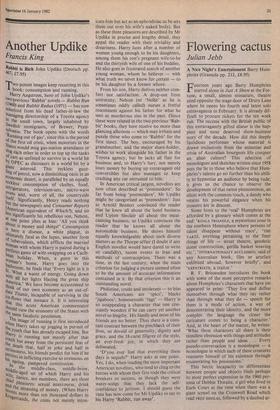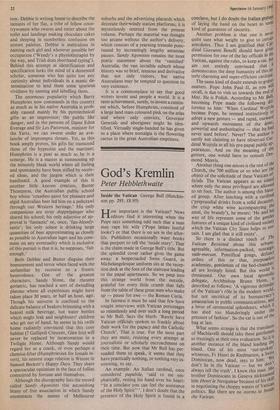Flowering cactus
Julian Jebb
Vourteen years ago Barry Humphries
starred alone in Just A Show at the For- tune, a small, almost miniature, theatre sited opposite the stage door of Drury Lane where he opens his fourth and latest solo extravaganza in February. It is already dif- ficult to procure tickets for the ten week run. The success with the British public of this extravagantly gifted diseur is the hap- piest and most deserved show-business story of the decade. How did this deeply fastidious performer whose material is drawn exclusively from the minutiae and trivia of Australian bourgeois life conquer an alien culture? This selection of monologues and sketches written since 1958 puts the lie to those who believe that Hum- phries's talents go no further than his abili- ty to hypnotise an audience by being rude; it gives us the chance to observe the development of that rarest phenomenon, an elitist with, the common touch, a dandy who retains his powerful elegance when his trousers are in descent.
Some hints to the 'real' Humphries are afforded by a glossary which comes at the end: 'KOALA TRIANGLE, a mysterious zone in the southern Hemisphere where persons of talent disappear without trace', 'THE YARTZ, anything pertaining to the finer things of life — street theatre, geodesic dome construction, gerilla basket weaving etc.', 'INTERNATIONALLY ACCLAIMED, said of any Australian book, film or artefact exhibited abroad, however briefly', and `EXPATRIATE, a traitor.'
R. F. Brissenden introduces the book with some of the most perceptive remarks about Humphries's characters that have yet appeared in print: 'They live and define themselves through what they say rather than through what they do — speech for them is a mode of action, a way of demonstrating their identity, and the more complex the language the closer the caricature comes to being a character.' And, at the heart of the matter, he writes: `What these characters all share is their mindless obsession with things and attitudes rather than people and ideas . . . Every pseudo-conversation is a monologue — a monologue in which each of these creatures reassures himself of his existence through enumerating his possessions.'
This hectic incapacity to differentiate between people and objects finds perhaps its most perfect expression in the 1960 per- sona of Debbie Thwaite, a girl who lived in Earls Court at the time when there was a giant scrawl on the Cromwell Road which read FREE SHEILAS, followed by a daubed ar-
row. Debbie is writing home to describe the inmates of her flat, a tribe of fellow coun- trywomen who swarm and totter about the toilet and landings making chocolate cakes and sleeping in numberless confusion on strewn palettes. Debbie is meticulous in naming each girl and wherever possible her occupation (Wendy's a physiotherapist by the way, and Trish does shorthand typing'). Behind this attempt at identification and specification lurks the mind of a demented scholar, someone who has quite lost any curiosity about individuals in a manic de- termination to lend them some spurious vividness by naming and labelling them.
The enormous popularity which Barry Humphries now commands in this country as much as in his native Australia is prob- ably caused mainly by his pyrotechnical gifts as an improvisor; the public like danger, and in the persons of Dame Edna Everage and Sir Les Patterson, minister for the Yartz, we can swoon under an ava- lanche of impromptu threats. Yet, as this book amply proves, his gifts far transcend those of the hypnotist and the martinet; Humphries is a poet as much as, he is a scourge. He is a master at summoning up the minutely bleak world where all feeling and spontaneity have been stifled by receiv- ed ideas, and the jargon which is their handmaid. A good example of this is another little known creation, Buster Thompson, the Australian public school boy whose 'ceaseless quest for pleasure and algid Australian beer led him on a pubcrawl through our Western heritage.' His only companions are stray doppelganger who shared his school; his only adjective of ap- proval is 'fantastic' or, once, 'fan-bloody- tastic'; his only solace is drinking large quantities of beer approximating as closely as possible to Australian lager and his com- ment on any eventuality which- is exclusive of this pursuit is that it is, he supposes, 'fair enough.'
Both Debbie and Buster disguise their bemusement and terror when faced with the unfamiliar by recourse to a frantic benevolence. One of the greatest characters, Sandy Stone, the rheumy geriatric, has reached a sort of dwindling plateau where all experiences might have taken place 30 years, or half an hour, ago. Though his universe is confined to the delicate balance of beakers brimming with a heated milk beverage, hot water bottles which might leak and neighbours' children who get out of hand, he seems in his twilit home radiantly convinced that this cosy habitat (7 Gallipoli Crescent, Glen Iris) will never be replaced by incarceration in a Twilight Home. Although Sandy would regard her as a crank, or even perhaps a chemise-lifter (Humphriesian for female in- vert), his nearest stage relation is Winnie in Samuel Beckett's Happy Days. They share a spectacular optimism in the face of follies committed by fortune and themselves.
Although the discography lists the record called Sandy Agonistes this astonishing litany of free association in which Sandy enumerates the names of Melbourne suburbs and the advertising placards which decorate theiriwindy station platforms, it is mysteriously omitted from the present volume. Perhaps the material was thought too arcane without the author's delivery, which consists of a yearning tremolo punc- tuated by increasingly lengthy amnesiac pauses. Sandy Agonistes remains the most poetic statement about the 'vanished' Australia, the vast invisible suburb whose history was so brief, tenuous and derivative that not only visitors, but native Australians may be tempted to question its very existence.
It is a commonplace to say that good writers invent and people a world. It is a rarer achievement, surely, to invent a contin- ent which, before Humphries, j consisted of a large land mass coloured pink on the atlas and where only convicts, Governor Generals and aborigines might be iden- tified. Virtually single-handed he has given us a place where nostalgia is the flowering cactus in the great Australian emptiness.



































 Previous page
Previous page